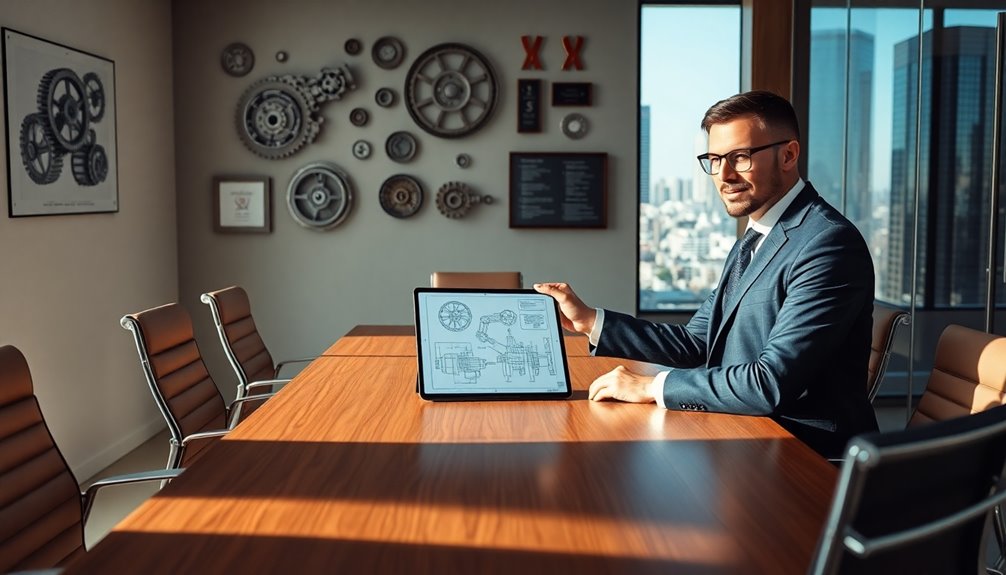To master the art of interview impressions, focus on preparation and confidence. Start by researching the company and crafting a strong elevator pitch. Anticipate common questions and practice your responses, keeping a positive tone throughout. Make a great first impression with a warm greeting and maintain engaged listening. Use positive body language, and remember to answer questions clearly. After the interview, follow up with a personalized thank-you note to reinforce your interest. This approach not only helps you stand out but also paves the way for deeper insights and strategies.
Key Takeaways
- Make a strong first impression with a confident greeting and professional demeanor to set a positive tone for the interview.
- Maintain engaged listening by nodding and responding appropriately to demonstrate interest and build rapport with the interviewer.
- Use thoughtful and concise responses to questions, showcasing your skills and experiences effectively while avoiding rambling.
- Exhibit positive body language, such as smiling and maintaining eye contact, to convey enthusiasm and confidence, especially in video interviews.
- Follow up with a personalized thank-you note to express gratitude and reinforce your interest, making you memorable to the interviewer.
Understanding Preliminary Interviews

Preliminary interviews typically last about 30 minutes and serve as the vital first step in the interview process. Conducted via video chat or phone call, these interviews help screen you for skills, qualifications, and genuine interest in the role.
They're designed to assess your personality fit within the company culture and determine whether you advance to in-person interviews. Hiring managers use this time to evaluate your communication skills and professionalism, ensuring you meet the minimum job requirements.
Preparation Tips for Success

To set yourself up for success in an interview, thorough preparation is key. Start by researching the company's services, products, and top clients. This not only shows your interest but also demonstrates your knowledge.
Treat this interview as seriously as any in-person meeting. Prepare a concise elevator pitch that highlights your skills and experiences, and think ahead about what you might be asked. Rehearse your answers to typical questions like "Tell me about yourself" and "Why are you interested in our company?"
Maintain an upbeat tone to convey enthusiasm, even without visual cues. Finally, remember to stay professional in all communications, reflecting the seriousness of the opportunity you seek. Your preparation will set the stage for a successful interview.
Common Interview Questions

Once you've prepared thoroughly, it's time to think about the questions you might face during the interview. Common inquiries often include, "Tell me a little bit about yourself." Here, focus on your professional background and interests.
Another frequent question is, "Why are you interested in our company?" Make sure to mention specific attributes that attract you.
You might also hear, "Why are you looking for a new job?" Use this chance to highlight your readiness for career advancement.
When asked about salary expectations, research industry averages to align your response with your qualifications.
Finally, be ready to discuss your strengths and weaknesses, showcasing both your personality and professionalism. Being prepared for these questions can greatly boost your confidence. Additionally, highlighting your emotional intelligence can demonstrate your adaptability and team management skills.
Making a Lasting Impression

Creating a lasting impression during your preliminary interview can greatly influence the hiring manager's perception of you. Start strong with a confident greeting and maintain an upbeat tone throughout. Engage actively by asking insightful questions and responding thoughtfully.
Here's a simple guide to help you remember key elements:
| Action | Description | Impact |
|---|---|---|
| Confident Greeting | Start with a warm, professional tone | Sets a positive first impression |
| Engaged Listening | Show interest in the conversation | Builds rapport and shows respect |
| Thoughtful Responses | Answer questions clearly and concisely | Demonstrates your qualifications |
| Positive Body Language | Smile and maintain eye contact (if video) | Exudes confidence and enthusiasm |
Additionally, practicing these techniques can help you overcome public speaking anxiety, allowing you to present yourself more effectively during interviews.
Follow-Up Strategies

Following up after your preliminary interview is essential for reinforcing your interest in the position and leaving a positive impression.
A well-crafted follow-up can set you apart from other candidates. Here are three effective strategies:
- Send a Thank-You Note: Within 24 hours, email a brief thank-you note to express gratitude for the opportunity and reiterate your interest in the role.
- Personalize Your Message: Reference specific topics discussed during the interview to show attentiveness and genuine engagement.
- Keep It Professional: Maintain a professional tone and avoid overly casual language. This reinforces your suitability for the company culture.
Signs of a Successful Interview

Successful interviews often reveal themselves through various subtle indicators that suggest a positive outcome. One major sign is the interviewer's body language, which can indicate their engagement and interest. If they lean in or nod, it's a good sign. Additionally, when they ask about your availability for future meetings or discuss next steps, that usually points to serious consideration.
Here's a quick overview of signs to look for:
| Positive Signs | What They Mean |
|---|---|
| Engaged body language | You're making a connection |
| Questions about your availability | They're interested in moving forward |
| Discussion of team fit | They see you as a potential match |
| Inquiries about other offers | They're seriously considering you |
Additional Resources for Candidates

To enhance your interview preparation, consider utilizing a variety of additional resources designed to guide candidates through the process. These tools can provide valuable insights and improve your confidence before the big day.
Here are three resources to explore:
- Resume and Cover Letter Samples: Review examples tailored to your industry, helping you craft standout documents that showcase your skills.
- Interview Prep Websites: Websites like Glassdoor or Indeed offer company-specific interview questions and candidate experiences, giving you a better understanding of what to expect.
- Networking Groups: Join online forums or local meetups to connect with others in your field. They can share tips, experiences, and advice that might give you an edge.
Additionally, consider exploring remote AI job opportunities as they are increasingly available and can offer valuable insights into industry expectations. Utilizing these resources can help you feel more prepared and confident during interviews.
Frequently Asked Questions
How Should I Dress for a Preliminary Phone Interview?
For a preliminary phone interview, you might think dressing up isn't necessary since it's not in person.
However, wearing professional attire can boost your confidence and help you stay focused. Choose something comfortable yet polished, like a collared shirt or blouse.
Even if the interviewer can't see you, your mindset will shift into a more professional mode. Plus, it shows respect for the opportunity.
Don't underestimate the power of dressing well!
What Technology Should I Use for a Video Interview?
When preparing for a video interview, it's crucial to choose reliable technology.
Using a laptop or desktop with a stable internet connection often works best, as they typically offer better video and sound quality than mobile devices.
Platforms like Zoom or Microsoft Teams are popular choices, so make sure you've downloaded the necessary software and tested it beforehand.
Don't forget to check your camera and microphone settings for maximum performance!
How Can I Handle Unexpected Interview Questions?
When you face unexpected interview questions, stay calm and take a moment to think.
It's okay to pause before responding. If you're unsure, ask for clarification or a moment to gather your thoughts.
Use your experiences to provide relevant examples, and focus on what you can control.
Remember, it shows adaptability if you handle surprises well.
Finally, keep a positive attitude; your demeanor speaks volumes about your personality and professionalism.
What Should I Do if I Feel Nervous During the Interview?
Nerves can feel like a storm brewing inside you, but you can calm that tempest. Take deep breaths and remind yourself that it's just a conversation.
Visualize success before the interview starts. Keep your body language open and maintain eye contact, even if it's over video.
Prepare thoroughly, so you'll feel more confident. And don't forget—it's okay to pause before answering; it shows you're thoughtful and engaged.
How Long Should I Wait Before Following up After an Interview?
You should wait about 5 to 7 business days after the interview before following up.
This timeframe allows the hiring team to review candidates without feeling rushed.
When you do follow up, send a brief, polite email expressing your continued interest in the position.
Mention that you appreciate the opportunity to interview and are enthusiastic to hear back.
Keeping it professional and concise shows your enthusiasm and respect for their process.
Conclusion
In the world of interviews, they say, "You never get a second chance to make a first impression." By mastering your preliminary interview skills, you can guarantee that your enthusiasm and qualifications shine through. Remember to prepare thoroughly, engage actively, and follow up thoughtfully. With these strategies in hand, you're not just another candidate; you're a memorable one. So, step into your next interview with confidence and make it count!









